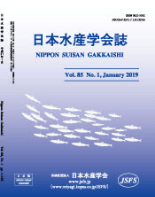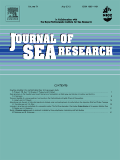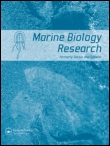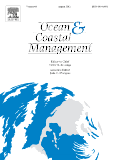
AFRICAN JOURNAL OF MARINE SCIENCE
Scope & Guideline
Navigating the challenges of Africa's dynamic marine landscapes.
Introduction
Aims and Scopes
- Marine Biodiversity and Ecology:
The journal focuses on the documentation and analysis of marine biodiversity, including species distributions, community structures, and ecological interactions within various marine habitats. - Fisheries Science and Management:
Research on the biology, ecology, and management of fish populations and fisheries practices is a core theme, addressing sustainability and conservation strategies for marine resources. - Impact of Climate Change:
The journal publishes studies examining the effects of climate change on marine ecosystems, including changes in species distributions, habitat alterations, and physiological responses of marine organisms. - Conservation and Marine Protected Areas:
Contributions related to conservation efforts, the effectiveness of marine protected areas, and management practices aimed at preserving marine biodiversity are prominent. - Human-Marine Environment Interactions:
Research exploring the socio-economic aspects of marine resource use, including the impacts of fishing, tourism, and pollution on marine ecosystems and communities.
Trending and Emerging
- Climate Change Adaptation Strategies:
Increasing research on how marine species and ecosystems adapt to climate change highlights the urgency of understanding resilience mechanisms in marine environments. - Use of Technology in Marine Research:
The adoption of advanced technologies, such as acoustic telemetry and DNA barcoding, is gaining prominence, facilitating better monitoring and understanding of marine fauna. - Marine Conservation and Policy Development:
There is a growing emphasis on research that informs policy and conservation strategies, particularly regarding marine protected areas and sustainable fisheries management. - Microplastics and Pollution Studies:
Research on microplastics and their impacts on marine life and ecosystems is trending, reflecting heightened global awareness and concern over plastic pollution. - Socio-Economic Impacts of Marine Resource Use:
Emerging studies focus on the socio-economic dimensions of marine resource use, assessing how local communities are affected by and can benefit from marine conservation efforts.
Declining or Waning
- Traditional Taxonomic Studies:
There has been a noticeable decrease in papers focused solely on taxonomic descriptions and classifications of marine species, as the field shifts towards more integrative and ecological approaches. - Localized Environmental Assessments:
Research specifically targeting localized environmental assessments has diminished, possibly due to a broader focus on global and regional marine issues, such as climate change and biodiversity loss. - Historical Marine Ecology:
Studies that emphasize historical data and long-term ecological changes are appearing less frequently, as the journal pivots towards more immediate ecological assessments and applied marine science.
Similar Journals

NIPPON SUISAN GAKKAISHI
Cultivating a Legacy of Aquatic Research ExcellenceNIPPON SUISAN GAKKAISHI, published by the Japanese Society of Fisheries Science, is a prestigious journal with a long history dating back to its inaugural issue in 1932. This journal, which spans key contributions to the field of Aquatic Science, serves as a vital platform for the dissemination of important research findings related to fisheries and aquatic biology, fostering knowledge and innovation in Japan and beyond. Although it is not an open-access publication, its rigorous peer-review process ensures the quality and integrity of the articles published. The journal is currently listed in the Q4 category for Aquatic Science according to the 2023 metrics, placing it within a niche but significant corner of the research landscape. With an ISSN of 0021-5392 and E-ISSN of 1349-998X, it continues to provide essential insights that benefit researchers, professionals, and students alike, highlighting advancements and challenges within aquatic ecosystems over a converged year span that continues to evolve through to 2024.

VIE ET MILIEU-LIFE AND ENVIRONMENT
Exploring the Depths of Ecology and Aquatic ScienceVIE ET MILIEU - LIFE AND ENVIRONMENT is a pivotal journal in the realms of aquatic science and ecology, serving as a vital platform for researchers and professionals interested in the interconnections between living organisms and their environments. Published by the esteemed OBSERVATOIRE OCEANOLOGIQUE BANYULS in France, this journal has been disseminating valuable research since its inception in 1980, with volumes covering various topics pertinent to environmental dynamics through to 2024. Despite its current classification in the Q4 quartile for both aquatic science and ecology, the journal offers a unique opportunity for scholars to contribute to niche areas often overlooked by more prominent publications. VIE ET MILIEU is committed to fostering a comprehensive understanding of ecological interactions and the conservation of aquatic ecosystems, making it an essential resource for those engaged in environmental science and biology. Researchers can access a wealth of knowledge that supports their work, encourages collaboration, and inspires innovative approaches to pressing ecological issues.

JOURNAL OF SEA RESEARCH
Unveiling the Mysteries of Our OceansJOURNAL OF SEA RESEARCH, published by Elsevier, is a premier academic journal dedicated to advancing knowledge in the fields of aquatic science, ecology, and oceanography. Since its inception in 1996, this journal has provided a vital platform for researchers and professionals to disseminate groundbreaking findings and promote fostering interdisciplinary discussions. With its impressive Q2 ranking in multiple categories, including Aquatic Science and Ecology, Evolution, Behavior and Systematics, it positions itself as a significant contributor to marine and environmental studies. The journal is accessible in both print (ISSN: 1385-1101) and online formats (E-ISSN: 1873-1414), ensuring wide reach and engagement within the scholarly community. Researchers and students alike will find the journal not only a reliable source of information but also a source of inspiration for future explorations. With a commitment to quality and a broad scope that spans fundamental to applied research, JOURNAL OF SEA RESEARCH remains an indispensable resource for understanding the complexities of marine environments and their relevance to our changing world.

REVMAR-Revista Ciencias Marinas y Costeras
Bridging global insights in marine biodiversity.REVMAR-Revista Ciencias Marinas y Costeras is an esteemed open-access journal published by the Universidad Nacional, Facultad de Ciencias Exactas y Naturales in Costa Rica. Since its establishment, it has focused on disseminating high-quality research in the fields of Marine and Coastal Sciences, contributing significantly to the understanding of aquatic ecosystems and their conservation. With a commitment to academic excellence, the journal has been continuously accessible since 2009, allowing researchers from around the globe to share findings without barriers. Although it holds a Q4 ranking in several key categories including Animal Science, Aquatic Science, and Ecology, the journal provides a vital platform for scholars at all stages of their careers to contribute to important dialogues surrounding marine biodiversity and environmental sustainability. As it enters a period of convergence from 2019 to 2024, REVMAR aims to enhance its visibility and impact within the scientific community while maintaining a focus on innovative research that addresses pressing ecological challenges faced by marine and coastal environments.

Marine Biology Research
Navigating the intersection of ecology and oceanography.Marine Biology Research is a premier journal published by Taylor & Francis, focusing on the dynamic field of marine biology and its intersecting realms of aquatic science, ecology, and oceanography. Since its inception in 2005, this journal has served as a crucial platform for researchers and professionals to disseminate their findings, with a vision extending to 2024 and beyond. The journal is recognized with a Q3 quartile ranking in both Aquatic Science and Ecology, Evolution, Behavior and Systematics, underscoring its growing influence in these fields as evidenced by its Scopus rankings. Located in the United Kingdom, Marine Biology Research aims to foster collaboration and innovation through open access options, facilitating knowledge exchange among the academic community. With a steady commitment to advancing marine sciences, this journal is an invaluable resource for those dedicated to understanding and preserving our ocean ecosystems.

Marine Biodiversity
Unveiling the Wonders of Oceanic DiversityMarine Biodiversity, published by SPRINGER HEIDELBERG, stands as a pivotal journal in the fields of Aquatic Science, Ecology, Evolution, Behavior and Systematics, and Oceanography. Established in 2009, it has gained a prominent place in academic discourse, evidenced by its Q2 ranking across multiple categories in the latest 2023 assessments. The journal operates out of Germany, specifically from its Heidelberg address, and caters to an international audience with a keen interest in the vast and complex dynamics of marine ecosystems. With an ongoing convergence of research outputs until 2024, Marine Biodiversity encourages contributions that expand our comprehension of marine life and its conservation, positioning itself as a vital resource for researchers, professionals, and students alike. Although currently not an open access journal, it maintains a robust reputation backed by its favorable Scopus ranks, which indicate its significant contribution to the respective fields. By disseminating high-quality, peer-reviewed articles, Marine Biodiversity plays an essential role in promoting scholarly communication and advancement in marine science.

OCEAN & COASTAL MANAGEMENT
Empowering Research for Oceanic ConservationOCEAN & COASTAL MANAGEMENT is a premier journal dedicated to the multifaceted fields of oceanography, aquatic science, and coastal management. Published by ELSEVIER SCI LTD and located in the United Kingdom, this esteemed journal boasts a remarkable Q1 ranking in prestigious categories, including Aquatic Science and Oceanography, reflecting its influential contributions to the field since its inception in 1992. The journal is recognized for its high impact, boasting a commendable presence in Scopus rankings across related disciplines, with notable placements in the 94th percentile for Aquatic Science and 92nd percentile for Oceanography. Although it operates under a subscription model, OCEAN & COASTAL MANAGEMENT continues to serve as a vital resource for researchers, professionals, and students seeking to advance their understanding of coastal ecosystems and effective management strategies. Through rigorous peer-reviewed research, the journal aims to foster knowledge exchange and practical applications in policy-making and environmental stewardship, making it an essential read for anyone engaged in the preservation and sustainable use of oceanic resources.

Journal of Marine Science and Technology-Taiwan
Bridging knowledge and technology in marine environments.The Journal of Marine Science and Technology-Taiwan, published by Nant Taiwan Ocean University, is a pivotal academic platform dedicated to the advancement of knowledge in the fields of marine science and engineering. With an ISSN of 1023-2796 and E-ISSN 2709-6998, this journal spans a wide array of topics relevant to the study and application of marine technology from 1998 to 2024. It ranks in the Q3 quartile in major categories such as Mechanical Engineering, Mechanics of Materials, and Ocean Engineering, illustrating its growing influence and the breadth of research it encompasses. Although currently not an open access journal, it provides critical insights to researchers, professionals, and students alike, making significant contributions to the understanding of marine environments and technologies. As the journal continues to evolve, its commitment to high-quality, impactful research remains central to its mission, empowering scholars to drive innovation in the dynamic field of marine science.

REVISTA DE BIOLOGIA MARINA Y OCEANOGRAFIA
Fostering Insights into Aquatic SciencesREVISTA DE BIOLOGIA MARINA Y OCEANOGRAFIA is a prominent academic journal dedicated to the fields of marine biology and oceanography, published by the Faculty of Marine Sciences and Natural Resources at Universidad de Valparaíso, Chile. Since its inception in 1996, this journal has been a vital platform for disseminating research findings and advancements in aquatic sciences, covering a breadth of topics relevant to the marine environment. With its current impact positioned within the Q4 quartile of both Aquatic Science and Oceanography categories in 2023, the journal serves as an essential resource for scholars, practitioners, and students alike, aiming to enhance their understanding of marine ecosystems. While the journal does not provide open access options, it continues to contribute valuable insights, helping to foster a deeper appreciation for oceanographic science and marine biodiversity. Located in the scenic city of Viña del Mar, Chile, this publication invites manuscripts that push the boundaries of knowledge and stimulate discourse within the marine sciences community, thereby promoting sustainable management and conservation of oceanic resources.

BULLETIN OF MARINE SCIENCE
Navigating the frontiers of marine research.BULLETIN OF MARINE SCIENCE, published by Rosenstiel School of Marine and Atmospheric Science, is a prominent journal dedicated to advancing the field of marine science through scholarly research and peer-reviewed articles. With an ISSN of 0007-4977 and an E-ISSN of 1553-6955, this journal has been contributing to significant scientific discourse since its inception in 1973. Covering a wide spectrum of topics in aquatic sciences and oceanography, it has maintained a respectable position in the academic community, as evidenced by its Q3 ranking in both categories for 2023. Although currently not an open-access journal, it provides essential access to groundbreaking research that informs marine conservation, ecological studies, and atmospheric sciences. Situated in the United States at 4600 Rickenbacker Causeway, Miami, FL 33149, the journal serves as a vital resource for researchers, professionals, and students seeking to engage with the latest findings in marine science and foster a deeper understanding of our oceans.